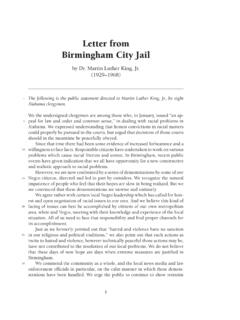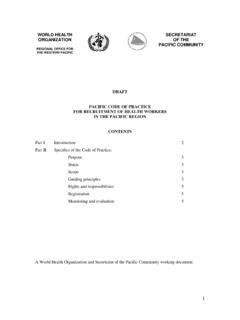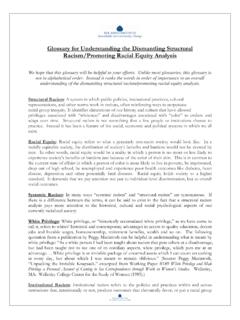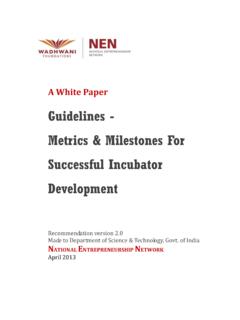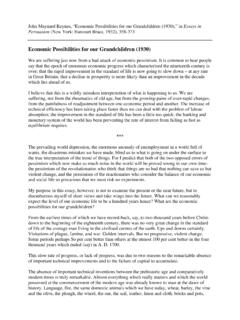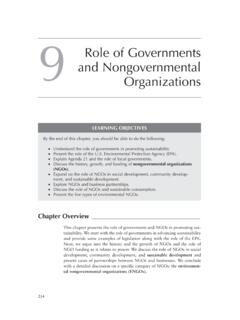Transcription of U.S. Foreign Policy in 2021: Five Priorities for a ...
1 Chapter 23 | Five Priorities for a Progressive Transatlantic Agenda Foreign Policy in 2021: Five Priorities for a Progressive Transatlantic AgendaTorrey TaussigIntroductionAmerican and European Policy makers will be presented with a daunting set of challenges in 2021. Foremost among them include threats to democratic institutions and free societies posed by authoritarian states; growing economic inequities on both sides of the Atlantic; the unmitigated effects of climate change; and most recently, the disastrous global financial and public health implications of COVID-19.
2 Unfortunately, the transatlantic relationship currently faces a significant deficit of trust that is inhibiting cooperation on this set of shared challenges. As a community comprised of some of America s strongest and most prosperous partners, this lack of trust and cohesion has significant consequences for interests at home and abroad. In the coming year, the United States and Europe may have an opportunity to overcome some of these challenges not by looking backward and reverting to old assumptions and policies, but by advancing a renewed and progressive transatlantic relationship.
3 This paper proposes five specific goals for Foreign Policy that aim to advance such an agenda while strengthening shared and European interests. 1. Pursue joint action with Europe on climate change as a top Foreign Policy priority. 2. Create a strong democratic playing field for competing with Advance technology for free societies through standard setting and joint research initiatives. 4. Enforce anti-corruption measures to strengthen democracy in the transatlantic Broaden the transatlantic economic agenda beyond trade to focus on digital issues and regulatory harmonization.
4 Each of these Policy goals is explored in-depth below and highlights tactical Priorities for the and Europe to pursue in 2021 and beyond. Geopolitical and Domestic Realities in 2021 Geopolitical realities in 2021 will provide even greater urgency for reviving the transatlantic relationship. Both Democrat and Republican Foreign Policy experts agree that America s unipolar moment is over. political, military, and economic influence is being challenged by a rising China that seeks to displace American power in the Indo-Pacific and compete with the for stronger ties with America s traditional allies, including those in Europe.
5 Russia is pursuing an irredentist Foreign Policy under President Vladimir Putin that undermines the strength of democratic and free societies in an attempt to maintain the Kremlin s internal legitimacy. Within the West, democratic backsliding and the emergence of populist nationalist forces are tearing apart the political and social fabrics of countries that have anchored the transatlantic relationship. 154 Domestic & International (Dis)Order: A Strategic ResponseDomestically, the United States will still be dealing with a pandemic not yet under control and a significant economic recession in 2021.
6 There will be little bandwidth to advance major Foreign Policy proposals that are not linked to alleviating America s economic and public health crises. But critical challenges on the world stage, ranging from China, Russia, Iran, and Afghanistan to trade and climate change, will remain. It is therefore critical that the United States have a willing and capable partner in Europe. This will require early and sustained attention to the transatlantic relationship, including a willingness to discuss issues central to Europe s politics, such as migration (and thus security issues in the Middle East and North Africa) and climate change.
7 Concerted and coordinated efforts by the and Europe will be more effective than unilateral steps taken by either the or European nations. The transatlantic relationship will also be important for achieving domestic Policy goals. The European Union is scheduled to propose legislation in 2021 and 2022 on issues such as economic recovery, trade, digital taxes, the regulation of social media, tariffs tied to carbon consumption, and the rule of law. It is possible that European regulations will set standards globally (as happened with European privacy rules for digital media).
8 Early and constructive engagement with Europe may provide a way to advance progress on these issues, particularly if the domestic context remains partisan and Policy Priorities for a Progressive Transatlantic Agenda 1. Pursue joint action with Europe on climate change as a top Foreign Policy priority. The Trump administration has significantly set back the United States in its domestic and global efforts to address climate change. If there is a new administration in 2021, the will have an opportunity to rebuild cooperation with Europe on advancing a progressive climate agenda.
9 Ursula von der Leyen, president of the European Commission, has deemed tackling climate challenges as this generation s defining task 1 and the Commission s first priority. Rejoining the Paris Agreement is only the first step. Vice President Biden has also pledged that under a Biden administration, the will be carbon neutral by 2050. Biden s proposal also makes a federal investment of $ trillion over the next ten years and leverages additional private sector, state, and local investments to total more than $5 This strong climate agenda is in line with European Union efforts.
10 Which as part of its European Green Deal Investment Plan aims to attract at least 1 trillion euros of public and private investment over the next decade to make the bloc carbon neutral by Much of the investments pledged in the and Europe will need to be used in support of technology innovation, which is an opportunity for and European public and private sector entities to boost joint funding initiatives and pool research and development. Early goals for the will be to prioritize and integrate climate into all aspects of the transatlantic relationship, including trade, energy, defense, and technological cooperation; to work with the European Union to coordinate the implementation of shared climate targets (specifically pledges to be carbon neutral by 2050).

